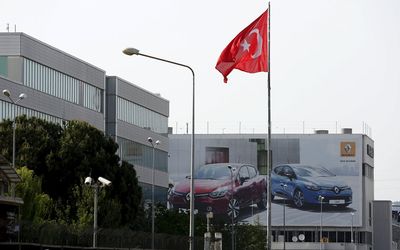EU leaders to try to seal migrant deal with Turkey
by Agency Staff,
2016-03-18 11:49:25.0
BRUSSELS — European Union (EU) leaders will try to seal a crucial deal with Turkey’s prime minister to solve the migration crisis on Friday after agreeing on a common position at a late-night summit.
EU president Donald Tusk will present Ahmet Davutoglu with the controversial proposals, under which Turkey would take all migrants and refugees coming to Greece, before a meeting of all 28 leaders.
Europe is counting on a deal to curb an unprecedented wave of 1.2-million migrants since the start of 2015, fuelled by the war in Syria, but Turkey will exact a heavy price for its consent.
Despite concern in many EU states about Ankara’s rights record, it has demanded an acceleration of its long-stalled bid for EU membership, billions of euro in extra aid and visa-free travel.
Critics have also raised concern that the deal could violate international laws that forbid the mass deportation of refugees.
The migrant crisis has left Europe increasingly divided, with the fear that its Schengen passport-free zone could collapse as states reintroduce border controls and concern over the rise of populist parties on anti-immigration sentiment.
But some European leaders voiced concern that the deal — under which the EU would take in one Syrian refugee from Turkish soil in exchange for every Syrian taken back by Turkey from Greece — would be illegal.
The aim of the "one-for-one" deal is to encourage Syrians to apply for asylum in the EU while they are still on Turkish soil, instead of taking dangerous smugglers’ boats across the Aegean Sea.
Lithuanian President Dalia Grybauskaite said the plan was "very complicated, will be very difficult to implement and is on the edge of international law."
Belgian Prime Minister Charles Michel evoked concern over Turkey’s rights record and its conflict with Kurdish separatists, adding: "I can’t accept negotiations which sometimes look like they are a form of blackmail."
German Chancellor Angela Merkel said the deal was a "good opportunity to stop the business of human traffickers".
Ms Merkel, however, insisted on "preconditions" and clear plans to deal with the logistics of processing thousands of asylum seekers on the Greek islands and sending them back to Turkey.
A senior EU official described the proposal Mr Tusk would present to Mr Davutoglu as a "common position" that took into consideration "everyone’s red lines" for the negotiations.
Late on Thursday, Mr Tusk presented changes to the deal to address some of the concerns — including the involvement of the United Nations’ refugee agency (UNHCR) in any deportations and that women and children should form the bulk of those taken under the scheme — steering it towards a consensus.
Mr Davutoglu said as he boarded a plane in Ankara that the proposed deal was "clear and honest" but added: "Turkey will never become an open prison for migrants."
He was due to meet Tusk, European Commission chief Jean-Claude Juncker and Dutch Prime Minister Mark Rutte at 7.30am GMT before EU leaders met again for final consultations expected at 12pm GMT, EU officials said.
One major hurdle that appeared to have been overcome was opposition from Cyprus, rooted in longstanding tensions with Turkey over Ankara’s refusal to recognise its government on the divided island.
Cypriot President Nicos Anastasiades indicated he could be ready to "compromise" on his objections to the EU, opening new "chapters" in Turkey’s accession process, after earlier threatening to block the entire deal.
The deal also envisages major aid for Greece, where tens of thousands of refugees are trapped in dire conditions after Balkan countries shut their borders to stop them heading north to richer Germany and Scandinavia.
AFP

A Turkish flag flies at Oyak Renault car plant in Bursa, Turkey. Picture: REUTERS
BRUSSELS — European Union (EU) leaders will try to seal a crucial deal with Turkey’s prime minister to solve the migration crisis on Friday after agreeing on a common position at a late-night summit.
EU president Donald Tusk will present Ahmet Davutoglu with the controversial proposals, under which Turkey would take all migrants and refugees coming to Greece, before a meeting of all 28 leaders.
Europe is counting on a deal to curb an unprecedented wave of 1.2-million migrants since the start of 2015, fuelled by the war in Syria, but Turkey will exact a heavy price for its consent.
Despite concern in many EU states about Ankara’s rights record, it has demanded an acceleration of its long-stalled bid for EU membership, billions of euro in extra aid and visa-free travel.
Critics have also raised concern that the deal could violate international laws that forbid the mass deportation of refugees.
The migrant crisis has left Europe increasingly divided, with the fear that its Schengen passport-free zone could collapse as states reintroduce border controls and concern over the rise of populist parties on anti-immigration sentiment.
But some European leaders voiced concern that the deal — under which the EU would take in one Syrian refugee from Turkish soil in exchange for every Syrian taken back by Turkey from Greece — would be illegal.
The aim of the "one-for-one" deal is to encourage Syrians to apply for asylum in the EU while they are still on Turkish soil, instead of taking dangerous smugglers’ boats across the Aegean Sea.
Lithuanian President Dalia Grybauskaite said the plan was "very complicated, will be very difficult to implement and is on the edge of international law."
Belgian Prime Minister Charles Michel evoked concern over Turkey’s rights record and its conflict with Kurdish separatists, adding: "I can’t accept negotiations which sometimes look like they are a form of blackmail."
German Chancellor Angela Merkel said the deal was a "good opportunity to stop the business of human traffickers".
Ms Merkel, however, insisted on "preconditions" and clear plans to deal with the logistics of processing thousands of asylum seekers on the Greek islands and sending them back to Turkey.
A senior EU official described the proposal Mr Tusk would present to Mr Davutoglu as a "common position" that took into consideration "everyone’s red lines" for the negotiations.
Late on Thursday, Mr Tusk presented changes to the deal to address some of the concerns — including the involvement of the United Nations’ refugee agency (UNHCR) in any deportations and that women and children should form the bulk of those taken under the scheme — steering it towards a consensus.
Mr Davutoglu said as he boarded a plane in Ankara that the proposed deal was "clear and honest" but added: "Turkey will never become an open prison for migrants."
He was due to meet Tusk, European Commission chief Jean-Claude Juncker and Dutch Prime Minister Mark Rutte at 7.30am GMT before EU leaders met again for final consultations expected at 12pm GMT, EU officials said.
One major hurdle that appeared to have been overcome was opposition from Cyprus, rooted in longstanding tensions with Turkey over Ankara’s refusal to recognise its government on the divided island.
Cypriot President Nicos Anastasiades indicated he could be ready to "compromise" on his objections to the EU, opening new "chapters" in Turkey’s accession process, after earlier threatening to block the entire deal.
The deal also envisages major aid for Greece, where tens of thousands of refugees are trapped in dire conditions after Balkan countries shut their borders to stop them heading north to richer Germany and Scandinavia.
AFP


















Change: -1.41%
Change: -1.30%
Change: -1.97%
Change: -1.08%
Change: -1.94%
Data supplied by Profile Data
Change: 0.10%
Change: -0.23%
Change: -1.41%
Change: 0.00%
Change: -0.09%
Data supplied by Profile Data
Change: 0.56%
Change: 0.33%
Change: 0.41%
Change: 0.45%
Change: 0.12%
Data supplied by Profile Data
Change: -2.15%
Change: -3.02%
Change: -3.28%
Change: -2.32%
Change: -0.24%
Data supplied by Profile Data